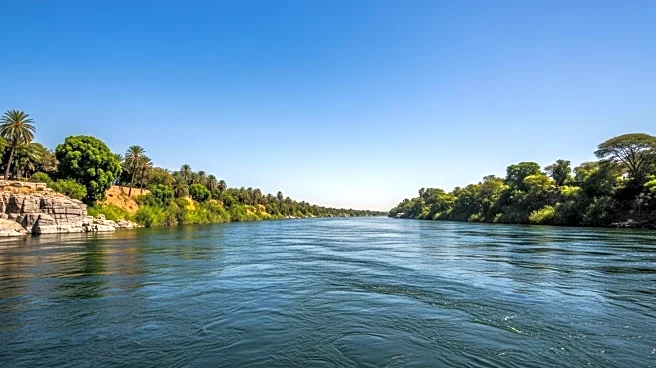What's Happening?
Flooding in Egypt's northern provinces has intensified regional tensions over the Nile River, with Egypt accusing Ethiopia's Grand Renaissance Dam of disrupting the river's flow. The floods have particularly affected the Beheira and Menoufia provinces, submerging farmland and homes, and prompting evacuation measures. Videos on social media depict residents wading through waist-deep water, with many homes partially submerged. In response to rising water levels, Egypt discharged water from its High Aswan Dam. Ethiopia, however, claims that its dam has mitigated flooding in Sudan, suggesting that the flood in Sudan could be from the White Nile and that the dam played a significant role in reducing potential catastrophic effects.
Why It's Important?
The situation underscores the ongoing diplomatic tensions between Egypt and Ethiopia over the Grand Renaissance Dam, which has been a source of contention for over a decade. The dam is crucial for Ethiopia's economic development and regional energy ambitions, but Egypt and Sudan fear it could significantly affect their share of the Nile's waters. The recent flooding has exacerbated these tensions, with Egypt framing the dam as an existential threat to its water security. The dispute highlights the broader geopolitical implications of water resource management in the region, affecting millions of people who rely on the Nile for their livelihoods.
What's Next?
The recent flooding and subsequent accusations are likely to intensify diplomatic efforts to reach a resolution. Egypt may continue to seek international support to pressure Ethiopia into a legally binding agreement on the dam's operation. Meanwhile, Ethiopia is expected to maintain its stance on the equitable use of the Nile's waters. The situation could lead to further regional instability if not addressed through diplomatic channels, potentially involving other African nations and international bodies in the negotiations.
Beyond the Headlines
The dispute over the Grand Renaissance Dam also raises broader questions about the equitable distribution of natural resources and the impact of large infrastructure projects on regional stability. The situation highlights the need for comprehensive water management strategies that consider the needs and rights of all countries sharing transboundary water resources. It also underscores the potential for water scarcity to become a catalyst for conflict in regions where water is a critical resource.









